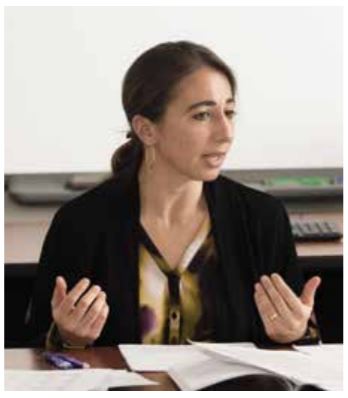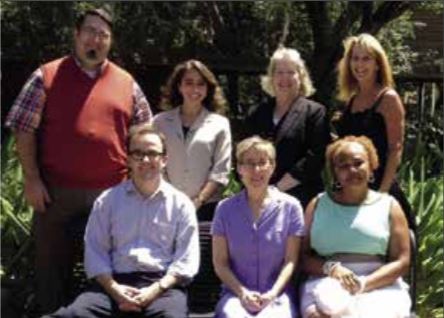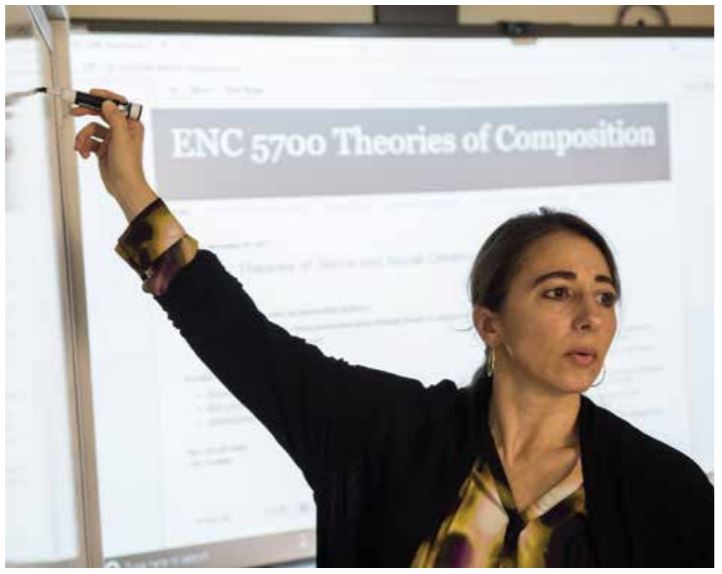Text technologies, rhetoric among interests of English department’s Graban

In the beginning, there was the word . . . then another word, and another. Words were strung together into sentences and sentences expanded into conversations, dialogues and arguments. When humans realized words and symbols could be used to persuade other humans to think or act in certain ways, rhetoric was realized as a discipline.
In everyday parlance, the word “rhetoric” can sometimes have a derogatory connotation — as when an argument is downplayed as “mere rhetoric,” which is a fancy way of saying “yada yada yada.” In reality, rhetoric is a complex and fascinating field of study. Just ask the graduate students in Florida State University’s Rhetoric and Composition program and the undergraduates in the Editing, Writing and Media track — they are taught by professors doing research that defines what makes rhetoric relevant and, indeed, essential in today’s world.
Tarez Samra Graban is one of those professors. With a double A.B. in English and religious studies from Brown University and a Ph.D. in English from Purdue University, she brings her own multicultural background and a fascination with how class, language and ethnicity intersect in modern discourse to the courses she teaches.
Graban’s bio on the English department website lists her areas of specialty as “histories of rhetoric, histories and theories of composition, digital humanities, feminist theory, archival studies and multilingualism.” In 2015, the associate professor published “Women’s Irony: Rewriting Feminist Rhetorical Histories,” a book that considers how applying irony to the examination of women’s historical narratives changes how they can be read, interpreted and applied to contemporary problems. She has a fascination with metadata mindsets and how itinerant technologies influence histories of rhetoric and composition, and her latest research delves into the problems of decolonizing the transnational archive.
Across the Spectrum magazine recently sat down with Graban to explore how her research and pedagogical approach is shaping a new generation of rhetoricians.
ATS: How did you first become interested in rhetoric as an area of study?
TSG: I had a career in publishing before going into higher education, and I enjoyed that career but it was a bit of a silent process for me. After completing a master’s thesis on how students compose in hypertext environments, I realized I had many more questions about the knowledge process than an empirical study could answer. It was various histories of rhetoric that lured me in — the idea that our ideas about knowledge are often influenced through our approaches to history — and I never wanted to do anything else after that.
My training was mainly in Western theories of rhetoric, but I have more recently been studying global rhetorical traditions reflected in some countries in southern and western Africa, and I hope to expand that study to the MENA (Middle East-North Africa) region and to India. Some ancient traditions are more multicultural than we realize.
My own upbringing is partly eastern, partly western. My father is Arabic and my mother is American. I spent my first 15 years living in another country. As a result, I was taught to value different cultural groups and communication systems, and to observe.
ATS: Has that multicultural outlook influenced your research and your teaching?
TSG: I am interested in different notions of “culture” and how they operate in text and influence our textual perceptions. Our cultural ideologies often influence our ideas about what it means to be an ethical citizen in the world, and these ideologies are to some extent historical. In some periods of rhetorical history, access to communication meant access to literacy, the right to vote, the right to participate in government, the right to learn, the right to live productively in society.
There are commonalities (between cultures), but oftentimes there are more subtle and rich distinctions, and it’s easy for us to undervalue the distinctions. It’s an interesting thing to realize that you can put the same gadget in the hands of similar users and still witness different outcomes. We witnessed the Arab Spring (a wave of revolutionary activity in the Middle East and North Africa that was fomented and documented on social media) to some extent because we had the cell phone. On the one hand, yes, this is awesome, but then we should notice that there are different ways that movement played out.
ATS: How do the courses offered at FSU make rhetoric relevant in the digital age?
TSG: I think we teach the digital and analog together. I teach a course in textuality called “What Is a Text?” It’s a regular offering for students in our Editing, Writing and Media track. We consider different ideas about what makes a text — not only what combinations of symbols and genres, but what beliefs or ideas about value and circulation make us recognize something as “text” — and we examine a number of textual forms. One way my own research agenda influences this course is my emphasis on human rights texts and cross-cultural events, and on applying transnational ways of thinking about these texts and events. These will range from the U.N. Declaration of Human Rights to graphic novels illuminating what journalists do in other parts of the world. We have to be willing to notice the institutional factors that contribute to why we do or don’t value these texts in certain ways.
Another area where my own research agenda helps me teach is my interest in text technologies. We have an introductory course called “History of Text Technologies” that goes from clay tablets to the computer. We give students a broad sweep.
I also have an interest in hypertext technologies, the idea underlying what we know as the World Wide Web. Even before the World Wide Web Consortium in 1994, scientists and humanists were working together to model what it could mean to make openly linked information accessible to other information. What gaps get created in the process, and how does this influence our understanding of what information is available? I am interested in having students recognize linkages between text technologies and question whether new technologies often re-image old desires or emulate familiar forms. For example, even our Kindles read like books.
ATS: You also teach a course in advanced writing and editing that you make relevant to current events.
TSG: I teach it as a course in public discourse in which we observe the “rhetorical life” of scientific and technical information — how it gets translated into public-sphere genres, what underlies the act of composing and what’s ethical and not ethical. We consider a lot of case studies in both public and counter-public spaces.
I like to teach this class during an election year. We had a great time with it last year. I didn’t want to focus explicitly on the election because the campaigns were so emotionally charged, so we focused on science-based consumer discourse. We examined whole debates about climate change, environmental responsibility and public policy, and used those to inform our study of what it means to research and write in the public sphere.
ATS: How has your own perception of rhetoric changed since you first began studying it?
TSG: I see it now as a way of making knowledge in the world. Others see it as a persuasive tool. Some will still call it an art. Part of the challenge of teaching rhetoric is helping students understand the different approaches to what rhetoric is and what it does. Just because one approach is true doesn’t mean another is false. Rhetoric has some fluidity as a discipline.
SIDEBAR:
FSU’s Rhetoric and Composition program

top row, Associate Professor Michael Neal, Associate Professor Tarez Samra Graban,
Professor Kathleen Blake Yancey and Senior Lecturer Deborah Coxwell-Teague; bottom
row, Teaching Faculty member Stephen McElroy,Professor (and program director)
Kristie S. Fleckenstein, and Associate Professor Rhea Estelle Lathan.
Florida State University offers an M.A. in rhetoric and composition and a Ph.D in English with an emphasis in rhetoric and composition. As outlined on the Department of English’s website, each degree offers a deep dive into “rhetorical and social practices and theories of composing and composition,” with a particular focus on how textual forms such as print, audio, visual and the digital intersect as technologies and literacies.
Students and faculty in the graduate programs collaborate on research and jointly publish books and articles, present at conferences together and work on writing grants together. The program also hosts distinguished scholars who share their latest research on rhetoric and composition.
Rhetoric and Composition also figures in FSU’s Editing, Writing and Media major track. EWM is touted as “a new English major for a new century” and “aims to prepare students for leadership roles in 21stt-century culture, whether as intellectuals pursuing advanced degrees in book history, rhetoric and critical theory or as tech-savvy professionals equipped with editorial expertise and writing skill.”
Read more about the Rhetoric and Composition program at www.english.fsu.edu/programs/rhetoric-and-composition.
—


